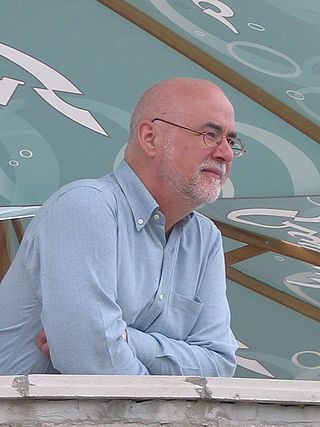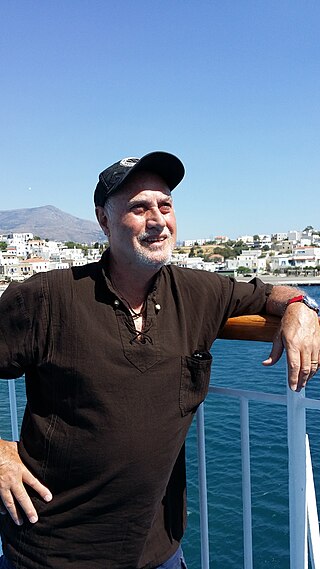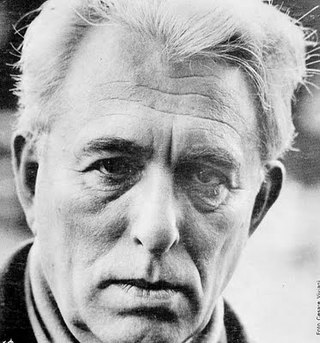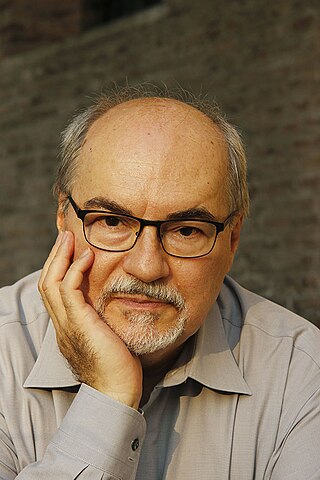
Eugenio Montale was an Italian poet, prose writer, editor and translator, recipient of the 1975 Nobel Prize in Literature and one of the finest literary figures of the 20th century.

Dario Bellezza was an Italian poet, author and playwright. He won the Viareggio, Gatto, and Montale prizes.

Attilio Bertolucci was an Italian poet and writer. He was the father of film directors Bernardo and Giuseppe Bertolucci.

Regina Derieva was an Odessa-born Russian poet and writer who published around thirty books of poetry, essays, and prose. From July 1999 until her death she lived in Sweden.
Sergio De Santis is an author known for his short stories.

Roberto Pazzi was an Italian novelist and poet. His works have been translated into twenty-six languages. He was widely recognized in Italian literary circles for his poetry and novels. His Debut novel, Cercando l'Imperatore in 1985, received a number of international awards and started a prolific career of historical and contemporary novels.

Margherita Guidacci was an Italian poet born in Florence, Italy. She graduated from the University of Florence in 1943 and traveled to England and Ireland in 1947.

Christopher Whyte is a Scottish poet, novelist, translator and critic. He is a novelist in English, a poet in Scottish Gaelic, the translator into English of Marina Tsvetaeva, Pier Paolo Pasolini and Rainer Maria Rilke, and a critic of Scottish and international literature. His work in Gaelic appears under the name Crìsdean MacIlleBhàin.

Luigi Augusto Fontanella is an Italian poet, critic, translator, playwright, and novelist.

Franco Fortini was the pseudonym of Franco Lattes, an Italian poet, writer, translator, essayist, literary critic and Marxist intellectual.

Giorgio Orelli was an Italian-speaking Swiss poet, writer and translator.
Alessandro Spina (1927–2013) was the pen name of Basili Shafik Khouzam. Born in Benghazi into a family of Syrian Maronites that originally hailed from Aleppo, Syria, Khouzam was educated in Milan and published his first story in Nuovi Argomenti. Following his return to Benghazi in 1954, Khouzam spent the next twenty-five years managing his father's textile factory in Benghazi while continuing to write in his spare time. Khouzam eventually left Libya in 1979 and retired to Franciacorta, Italy. Khouzam was associated with various leading Italian writers of his time, including Alberto Moravia, Giorgio Bassani, Vittorio Sereni, and Claudio Magris and his novels were published by various imprints such as Mondadori and Garzanti. His major opus was I confini dell'ombra, a sequence of eleven historical novels and short story collections that chart the history of his native city from the Italo-Turkish War in 1911 to the exploitation of Libya's vast oil reserves in 1964. Although Khouzam individually published each instalment of his epic throughout the 1970s and 1980s, the entire sequence was finally issued as a 1268-page omnibus edition by Morcelliana in 2006 and was then awarded the Bagutta Prize in 2007. His work has been compared to that of Paul Bowles and Albert Cossery
Franco Buffoni (1948) is an Italian poet, translator and professor of literary criticism and comparative literature. He was born in Gallarate (Lombardy) and lives in Rome.

Barbara Carle is a French-American poet, critic, translator and Italianist. She is Professor Emerita of Italian at California State University Sacramento.

Alessandro Carrera is an Italian poet, writer, essayist, translator. and songwriter. Since 2001, he is Director of Italian Studies and Graduate Director of World Cultures & Literatures at the University of Houston. He has published poems, short stories, novels, and books and essays on literature, philosophy, music, cinema, the arts, and current events. Since 2019, he is editor-in-chief of «Gradiva. International Journal of Italian Poetry»GRADIVA | Casa editrice Leo S. Olschki
Richard Dixon is an English translator of Italian literature. He translated the last works of Umberto Eco, including his novels The Prague Cemetery, shortlisted for the Independent Foreign Fiction Prize 2012, and Numero Zero, commended by the judges of the John Florio Prize, 2016. He has also translated works by Giacomo Leopardi, Roberto Calasso and Antonio Moresco.

Guido Ceronetti was an Italian poet, philosopher, novelist, translator, journalist and playwright.

Claudio Damiani is an Italian poet. He was born in San Giovanni Rotondo in the south of Italy (Puglia) in 1957 though at an early age, he moved to Rome where he still lives. He made his debut in 1978 in Nuovi Argomenti, the magazine directed by Pasolini, Moravia and Bertolucci. In the first half of the 1980s, he was among the founders of the magazine Braci, where a new classicism was proposed. Inspired by ancient Latin poets and by the Italian Renaissance, his themes are mainly nature and cosmos, with a side attention to current scientific research. "If the Horatian scenes of Sabina refer to a type of modern Arcadia, their specific quality is above all to approach a voice that is internal and literally poetic, refounded and reguarded like an unexpected and precious gift". His poems have been interpreted by such actors as Nanni Moretti and Piera Degli Esposti. Main prizes and awards: Premio Montale, Premio Luzi, Premio Lerici, Premio Volterra, Premio Laurentum, Premio Brancati, Premio Frascati, Premio Alpi Apuane, Premio Camaiore.

Giorgio Ficara is an Italian essayist and literary critic. He is Full Professor of Italian Literature at the University of Turin.
Mario Benedetti was an Italian poet. He was among the founders of the contemporary poetry magazines Scarto minimo and Arsenal littératures.















